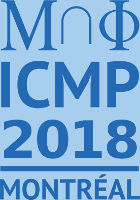Quantum Mechanics & Spectral Theory
- Jan Philip Solovej (University of Copenhagen)
- Stéphane Nonnenmacher (Université Paris-Sud)
- Tuesday, Jul 24 [symposia auditorium]
- 16:30 IUPAP Young Scientist Award Lecture, No presentation title available
- 17:00 Frédéric Faure (Institut Fourier Université de Grenoble Alpes), Emergence of quantum chaos in classical deterministic chaotic dynamics
- 17:30 Dima Jakobson (McGill University), Large covers and sharp resonances of hyperbolic surfaces
- 18:00 Ari Laptev (Imperial College London), Spectral properties of some functional-difference operators for mirror curves
- Wednesday, Jul 25 [symposia auditorium]
- 15:15 Hermann Schulz-Baldes (University of Erlangen-Nirnberg), Topological invariants in disordered topological insulators
- 15:45 Alexander Sobolev (University College London), Formulas of Szegő type for the periodic Schrödinger operator
- Frédéric Faure
Institut Fourier Université de Grenoble AlpesEmergence of quantum chaos in classical deterministic chaotic dynamicsIn the 80's, D. Ruelle, D. Bowen and others have introduced probabilistic and spectral methods in order to study deterministic chaos ("Ruelle resonances"). For a geodesic flow on a strictly negative curvature Riemannian manifold, following this approach and use of microlocal analysis, one obtains that long time fluctuations of classical probabilities are described by an effective quantum wave equation. This may be surprising because there is no added quantization procedure. We will discuss consequences for the zeros of dynamical zeta functions. This shows that the problematic of classical chaos and quantum chaos are closely related. Joint work with Masato Tsujii. - Dima Jakobson
McGill UniversityLarge covers and sharp resonances of hyperbolic surfacesAfter a short survey of results about distribution of resonances for hyperbolic surfaces, I will discuss recent joint work with Frederic Naud and Louis Soares, where we study behaviour of resonances for large degree covers. Using techniques of thermodynamic formalism and representation theory, we prove new existence results of "sharp non-trivial resonances" in the large degree limit, for abelian covers and infinite index congruence subgroups. - Ari Laptev
Imperial College LondonSpectral properties of some functional-difference operators for mirror curvesWe present some results related to spectral properties of functional-difference operators associated to mirror curves of special del Pezzo Calabi-Yau threefolds inc.luding Weyl tyle asymptotics. These operators are $H = U +U^{-1}+V + V^{-1}$ and $H_{m,n} = U +V +q^{mn} U^{-m}V^{-n},$ where $U$ and $V$ are self-adjoint Weyl operators satisfying $UV = q^2 VU$ with some $q = e^{ib^2},$ $b > 0$. We prove that $H$ and $H_{m,n}$ are self-adjoint operators with purely discrete spectrum. In particular, using the coherent state transform we prove the Weyl law for the eigenvalue counting function $N(\lambda)$ for these operators, which imply that their inverses are of trace class.
- Hermann Schulz-Baldes
University of Erlangen-NirnbergTopological invariants in disordered topological insulatorsThe mathematics of topological insulators concerns invariants, index theorems and the bulk-boundary correspondence. These concepts and results are explained on the example of one-dimensional chiral systems. Particular focus will then be on the spectral localizer, a recently developed technique to detect non-trivial topology locally in physical space. It makes any kind of index pairing numerically accessible. The associated index-theoretic proof heavily uses fuzzy spheres.
- Alexander Sobolev
University College LondonFormulas of Szegő type for the periodic Schrödinger operatorWe prove asymptotic formulas of Szeg\H o type for the periodic Schrödinger operator $H=-\frac{d^2}{dx^2}+V$ in dimension one. Admitting fairly general functions $h$ with $h(0)=0$, we study the trace of the operator $h(\chi_{(-\alpha,\alpha)}E_{(-\infty,\mu)}(H)\chi_{(-\alpha,\alpha)})$, as $\alpha\to\infty$, where $\chi_{(-\alpha, \alpha)}$ is the indicator of the interval $(-\alpha, \alpha)$ and $E_{(-\infty,\mu)}(H)$ is the spectral projection of $H$ for the interval $(-\infty, \mu)$.


